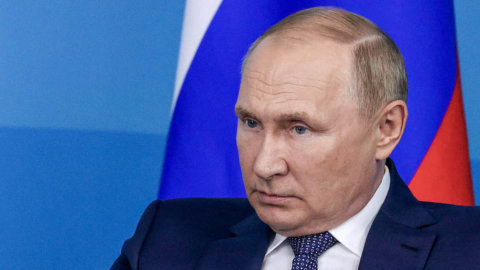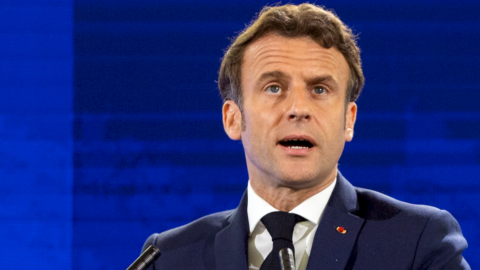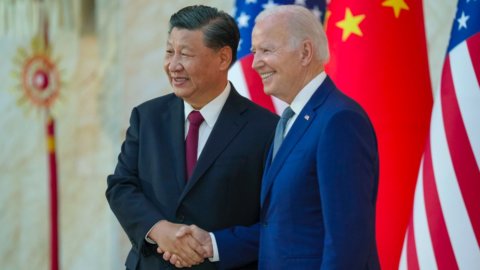Ukraine is a very delicate point on the fragile international scene. Twenty years ago it wasn't even a nation and today, Stefano Grazioli tells us, it is a country that no longer exists. Stefano Grazioli, author of the homonymous book Ukraine 2009-2019. Notes from a country that no longer exists (goWare 2020), has been writing about the post-Soviet space for over twenty years. These are countries, such as Russia and Ukraine, where you have also resided for long periods. Today Grazioli works in Germany and writes about these matters for various newspapers.
In this book he has collected and organized his reportages on the country of the ex-Cortina. These are interventions that cover a period that goes from the sinking of the Orange Revolution to the ascent to the presidency of Volodymyr Zelensky, a TV comedian who impersonated former President Poroshenko. Grazioli offers a precise and analytical picture of the former Soviet republic, today the scene of a proxy battle by the major world powers.
Ukraine can also be seen, yes as an unfortunate and battered country, but also as a large post-Cold War laboratory. It seems that even the very future of the American presidency, now and in perspective, depends on events that have taken place in this country so far from Washington, but so important to Washington.
From Grazioli's volume we offer to our readers a large excerpt dedicated to the "green wave" which brought Volodymyr Zelensky to the presidency and the imaginary epilogue of the Ukraine question that the author hypothesizes describing in 2034. A short and amusing political fiction divertissement that Grazioli allows himself at the end of a close and punctual historical and political reconstruction of the troubled decade of Ukraine.
The green wave
A success beyond expectations. Volodymyr Zelensky with his Servant of the People smashes the Ukrainian box office and conquers the absolute majority in the Rada. Over 40% in the proportional representation and a good portion of the single-member constituencies won, around one hundred, which allow him to reach over 226 deputies in Parliament, the official threshold for an absolute majority in an assembly that theoretically has 450 seats, but which does not assign 26, those of the occupied regions of Donetsk and Lugansk, as well as the Crimea.
The green wave, which had already changed the characteristics of the political spectrum of the former Soviet republic with the presidential elections in April, strikes again and knocks out the old guard. Almost. For ex-president Petro Poroshenko, after the defeat in the presidential elections three months ago, this time it is another bitter pill to swallow. His party loses the stronghold of Lviv, two thirds of the total votes and stands at around 8%. An announced disaster that confirms how voters have largely abandoned the chocolate oligarch, after five years of fruitless stay at Bankova.
There is little to smile about too the other old fox of Ukrainian politics, Yulija Tymoshenko, which confirms its contingent of deputies in the Rada, more or less like in the last legislature, but fails to expand its electorate. On the other hand, a new face is that of the rock singer Svyatoslav Vakarchuk, leader of the well-known band Okean Elzy, who took Zelensky, the actor who became president, as his model and also managed to exceed the 5% threshold with his Voce party.
A separate discussion must be made for the Opposition Platform, i.e. the party heir to the Party of Regions of the old president Viktor Yanukovych, sidelined by the revolution five years ago: the pro-Russians have enjoyed considerable success in the east and south of the country , in the oblasts of Donetsk and Lugansk they are even the first party and nationally, with 12%, second behind Zelensky. At the top is Jurij Boiko, ex-minister of energy under the president who fled to Russia after the 2014 revolution. The gray eminence is Viktor Medvedchuk, who by the way has a daughter whose godfather is Vladimir Putin.
So far the parties that have crossed the threshold; to keep out more or less illustrious names in Ukraine, with the entire nationalist front, from Oleg Lyashko to Oleg Tyahnybok's radical right, which remains dry. At first glance, the new Rada becomes more uniform, even if we will have to wait for the list of winners in single-member constituencies and see who will be the new so-called independent deputies, about sixty. The role of some of them could become very important in forming the next government.
If at the end of the day the absolute majority for Servant of the people is confirmed, the President's party could govern alone: however we have to wait and see how many seats there will be. With a narrow majority, a coalition government will probably be born in Kiev. In this sense, considering the Opposition Platform out of the picture, together with Poroshenko's party, Zelensky will be able to ally either with Tymoshenko or with Vakarchuk. Yesterday the President already said that he will have talks with the representatives of the parties and we will see how the negotiations will go in the next few days. But Zelensky could also co-opt a good number of candidates who entered the single-member independents and thus ensure a comfortable majority, without having to deal with other leaders.
In any case after these elections it is clear that in Kiev there will be a uniform President and Government, something that has already happened in the past, even if not in these dimensions. On the one hand this means the possibility of being able to act with great freedom and efficiency on the side of the reforms that the country needs, especially the economic ones, without forgetting the fight against corruption; on the other hand, however, the expectations of the electorate are also increasing, and they will want to see results immediately. Until now Zelensky had the alibi of an unfavorable Parliament, from now on he will be measured against the facts.
The main knot however remains that of the conflict in Donbass: surely the President with the support of Parliament will have more say in the matter, but a lot depends on how Russia behaves. Even Poroshenko, at least in the beginning, had the unchallenged support of the Government and Rada, but with the Kremlin he failed to pull a spider out of the hole and the process of reconciliation with the Minsk agreements has remained waste paper. It is not excluded that Zelensky and Putin will soon meet and this would in any case be a good sign, compared to the stalemate with the previous government and president.
2034 – Epilogue
Thirty years have passed since the first revolution in Ukraine. The orange one in 2004 was the first to shake the already fragile foundations of the former Soviet republic. Little changed then, in the sense that the political-economic establishment remained the same: no heads really rolled, there was only an exchange of armchairs in Kiev. Via Kuchma and Janukovych, temporarily, inside Yushchenko and Tymoshenko. But the international picture had already changed. Russia was not the shabby one of Boris Yeltsin, but the muscular one of Vladimir Putin, reluctant to make geopolitical concessions on what he still considered his "backyard".
The "revolution of dignity", or presumed, of 2014 was in the same way and the Maidan massacre and the consequent annexation of Crimea followed the presidency of Poroshenko, conditioned by the war in Donbass and for this and other reasons bankruptcy. The third revolution, the green one of Zelensky in 2019, was not identified as such, because it was without bloodshed, but it was the one that started the most radical, albeit partial, change. The new President fifteen years ago he basically had three options before him: really sweep away the old system, be destroyed by it, or compromise. Zelensky and Ukrainian "digital populism" have chosen the third way.
The political-economic structure based on the oligarchy has only been partially dismantled, the powers that be have reduced their influence, even if they continue to hold the reins today of what remains of big industry and above all of the new one, which relies on the control of data and information. The large privatizations that began in the last decade have favored the usual suspects, their heirs and their allies in the West, the United States in primis. Washington is the main point of reference for Kiev, which however continues to have to deal with Moscow and has let itself be tempted by the advances of Beijing. The war in Donbass has remained essentially unresolved and the independent republics of Lugansk and Donetsk are a black hole in the heart of Europe. Relations with Brussels are stable, but cold. The doors of the Union have remained closed, just like those of NATO.
Zelensky's Ukraine, re-elected for the second time in 2024, then leaving the baton to the first female president in an ex-Soviet republic (come out, like its predecessor, from an "oligarchic casting") has transformed itself from a laboratory where innovation and corruption coexist in a modern country, but always blocked by the proxy war which still engages Russia and the United States, while China is taking advantage of it, playing on the option of the Silk Road and its hubs between the Carpathians and the Black Sea.





